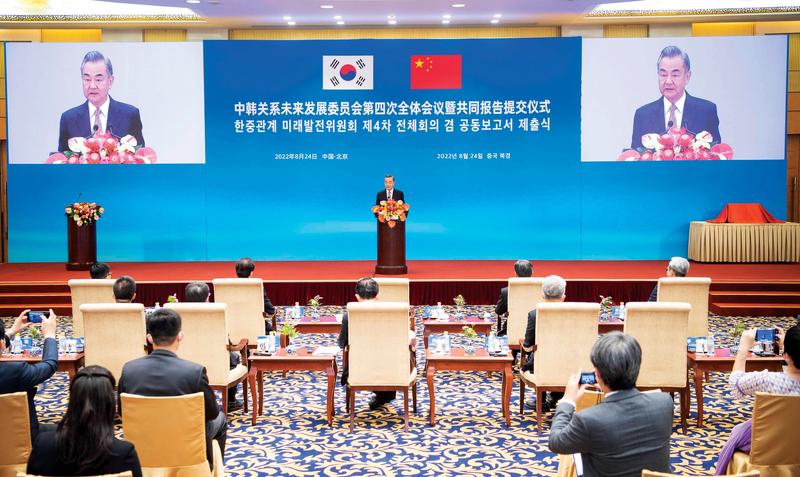Leaders stress benefits from the relationship, eye cooperation to shore up growth and unity
 Chinese State Councilor and Foreign Minister Wang Yi attends a submission ceremony of the joint report of the committee for future development of China-ROK relations in Beijing, while his Republic of Korea counterpart Park Jin participates in Seoul on Aug 24. (LI TAO / XINHUA)
Chinese State Councilor and Foreign Minister Wang Yi attends a submission ceremony of the joint report of the committee for future development of China-ROK relations in Beijing, while his Republic of Korea counterpart Park Jin participates in Seoul on Aug 24. (LI TAO / XINHUA)
‘Mutual respect” and “cooperation” stood out as two key phrases used in festive messages by the leaders of China and the Republic of Korea on Aug 24 to mark the 30th anniversary of the two countries establishing diplomatic relations.
Observers said the messages, especially the one from Chinese President Xi Jinping, reminded the two leading East Asian economies of the necessity to join hands to overcome unprecedented economic downturns and to overcome outsiders’ efforts to sow discord between them.
Xi and ROK President Yoon Suk-yeol exchanged congratulatory messages on Aug 24 to celebrate the anniversary.
In his message, Xi praised the “all-around development” of the relationship, which, with fruitful outcomes, “has brought major benefits to the two countries and their people” and “made major contributions to the peace and development of the region, as well as the world”.
Calling on the two nations to build on such “valuable experiences”, Xi attributed the “brilliant achievements” made in bilateral ties to staying committed to four points: great insight that adapts to the changing times; mutual respect, trust, and taking good care of core interests and the major concerns of each other; cooperation and a win-win approach that lead to common prosperity; and openness and inclusiveness that boost regional stability, growth and the basic norms of international relations.
Noting that the world is currently experiencing a “critical moment”, Xi said the global community, including the two countries, could overcome these problems “only through solidarity and cooperation”.
The Chinese president set the goal for the two countries to be “good neighbors, good friends and good partners”.
Xi said he is ready to work with Yoon so that the two nations can “better grasp the big picture, get rid of interference, consolidate their friendship and focus on cooperation”.
Noting that annual bilateral trade has increased nearly 50-fold over the past 30 years, Yoon said in his message that the two countries are expected to build on the spirit of mutual respect and make their ties more mature and healthy.
China and the ROK are expected to deepen high-level exchanges and strengthen substantial cooperation in areas such as economic security, particularly in relation to supply chains, as well as the environment and climate change.
As travel between the two countries has increased tenfold over the past 30 years, Yoon said the celebrations of the 30th anniversary are expected to deepen friendship between the citizens of both countries.
Also on Aug 24, Premier Li Ke-qiang and ROK Prime Minister Han Duck-soo exchanged congratulatory messages.
Li said he hoped for new and greater achievements from the “healthy, stable development” of the China-ROK strategic cooperative partnership.
Han said he looked forward to both countries accelerating the second phase of negotiations on their bilateral free trade agreement and strengthening teamwork in areas such as supply chains, culture and environmental protection.
Xing Haiming, Chinese ambassador to the ROK, said at a reception on Aug 22 that “there will be no mountains that cannot be conquered” by the two countries as long as they understand each other and “respect and take good care of each other’s core concerns and major interests”.
Senior policy advisers and experts have warned that there are voices in Seoul calling for economic decoupling with China.
Some people’s proposal for the ROK to have economic dependence on China and military dependence on the US could turn “a balanced approach” into “a deadlocked dilemma”, Han Fangming, deputy director of the Foreign Affairs Committee of the Chinese People’s Political Consultative Conference National Committee, said in an article published recently.
Peace on the Korean Peninsula “will be an unattainable scenario if there are security delusions relying on US military engagement”, he said.


